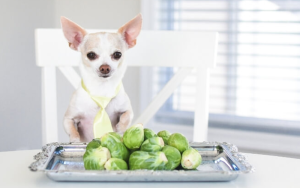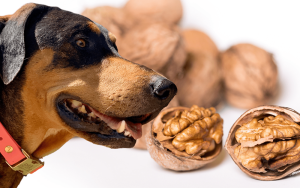Can Dogs Eat Peanuts? A Comprehensive Guide for Pet Owners Introduction

As a dog owner, it’s natural to want to share the foods you love with your furry friend. Peanuts are a popular snack among humans, known for their taste and nutritional benefits. However, when it comes to feeding your dog peanuts, many pet owners wonder
whether this treat is safe or harmful to their canine companions. In this detailed guide, we will explore whether dogs can eat peanuts, what precautions should be taken, and how to incorporate them safely into your dog’s diet if appropriate.
Can Dogs Eat Peanuts? The Short Answer
Yes, dogs can eat peanuts in moderation, but there are several important factors to consider. While peanuts are not toxic to dogs, they are not the ideal treat for all canines. In this article, we will go over the benefits and risks of feeding peanuts
to your dog, as well as the best practices to ensure your pet stays healthy and safe.
The Nutritional Benefits of Peanuts for Dogs
Peanuts are a nutrient-rich food for humans, and they also offer several health benefits for dogs. Here are some of the key nutrients found in peanuts that can support your dog’s overall health when consumed in moderation:
-
Protein: Peanuts are a good source of plant-based protein, which is essential for your dog’s muscle growth and repair. Protein is a vital macronutrient that helps maintain healthy skin, fur, and nails, and supports the immune
system. -
Healthy Fats: Peanuts contain unsaturated fats, which can help support your dog’s skin and coat. These fats also provide a concentrated source of energy for your dog, making peanuts a calorie-dense treat.
-
Vitamins and Minerals: Peanuts contain essential vitamins and minerals, such as Vitamin E, B vitamins, magnesium, and potassium. These nutrients contribute to overall health, supporting your dog’s immune function, nervous system,
and muscle function.
The Risks of Feeding Peanuts to Dogs
While peanuts can provide benefits, there are also risks associated with feeding them to your dog. Here are some of the most important risks to be aware of:
-
Choking Hazard: Whole peanuts can pose a choking risk, especially for smaller dogs or those prone to swallowing food quickly. It’s essential to break peanuts into smaller pieces or opt for peanut butter, which is safer for most
dogs to consume. -
Allergies: Just as some humans have peanut allergies, dogs can also be allergic to peanuts. Symptoms of a peanut allergy in dogs include itching, hives, swelling, vomiting, or diarrhea. If you suspect your dog is allergic to peanuts,
stop feeding them immediately and consult with your veterinarian. -
High Fat Content: Peanuts are calorie-dense and contain a significant amount of fat. While the fats in peanuts are generally healthy, excessive consumption can lead to obesity, pancreatitis, or other digestive issues in dogs.
It’s important to limit peanuts to an occasional treat, especially for dogs prone to weight gain or those with pre-existing health conditions. -
Salt and Seasonings: Many peanuts sold for human consumption are salted or flavored with spices. These added seasonings can be harmful to dogs, leading to sodium poisoning or upset stomachs. Always opt for unsalted, unflavored
peanuts if you choose to give them to your dog. -
Aflatoxins: Aflatoxins are toxic compounds that can be found in moldy peanuts. Ingesting peanuts contaminated with aflatoxins can cause severe liver damage, so it’s critical to avoid feeding your dog peanuts that appear moldy
or have been stored improperly.
How to Safely Feed Peanuts to Your Dog
If you decide to feed your dog peanuts, here are some important tips to ensure it’s done safely:
-
Choose Unsalted, Raw, or Roasted Peanuts: When selecting peanuts for your dog, make sure they are unsalted, and avoid those that are flavored or coated with chocolate, sugar, or other harmful additives. Roasted peanuts are often
a safer option than raw peanuts, as roasting helps kill any potential bacteria or mold. -
Serve in Moderation: Peanuts should be treated as an occasional treat, not a regular part of your dog’s diet. Stick to small quantities, especially if your dog is on a calorie-controlled diet or is prone to weight gain. A few
peanuts as a snack should be sufficient for most dogs. -
Avoid Peanut Butter with Xylitol: Many dogs love peanut butter, but it’s important to be cautious about the ingredients. Some peanut butter brands contain xylitol, a sugar substitute that is extremely toxic to dogs. Always check
the label and opt for peanut butter that contains only peanuts and possibly a little salt. Avoid any that contain artificial sweeteners, chocolate, or other harmful additives. -
Monitor for Allergic Reactions: If it’s your dog’s first time eating peanuts, introduce them slowly and monitor for any signs of an allergic reaction. If your dog experiences symptoms such as vomiting, diarrhea, or excessive itching,
contact your veterinarian immediately. -
Chop Peanuts into Small Pieces: To reduce the risk of choking, especially for small dogs, chop peanuts into smaller pieces. Alternatively, consider using peanut butter or peanut paste, which eliminates the choking risk entirely.
Alternatives to Peanuts for Dogs
While peanuts can be a safe and enjoyable treat for some dogs, they are not the only option. There are plenty of other healthy snacks that can provide your dog with the nutrients they need without the risks associated with peanuts. Here are some great
alternatives:
- Carrots: High in fiber, vitamins, and antioxidants, carrots are a crunchy, low-calorie snack that most dogs enjoy.
- Apples: Apples are rich in fiber and Vitamin C, and they make a refreshing snack for your dog. Just be sure to remove the seeds, as they can be harmful.
- Bananas: A great source of potassium and fiber, bananas are another dog-friendly fruit that can be fed in moderation.
- Sweet Potatoes: Rich in beta-carotene and fiber, cooked sweet potatoes make a healthy and satisfying treat for your dog.
- Pumpkin: Pumpkin is rich in fiber and can help with digestive health. Many dogs enjoy the taste of plain, cooked pumpkin.
Conclusion
So, can dogs eat peanuts? The answer is yes—peanuts are generally safe for dogs when fed in moderation and with the proper precautions. They offer nutritional benefits like protein, healthy fats, and vitamins, but they also come with risks such as allergies,
choking hazards, and digestive issues if not prepared properly.
As with any treat, it’s important to keep peanuts as an occasional snack and ensure they are given in small, manageable amounts. Always opt for unsalted, unseasoned peanuts, and monitor your dog for any signs of an allergic reaction. If you’re unsure
whether peanuts are a good option for your pet, or if your dog has a history of health issues, consult your veterinarian for personalized advice.
By following these guidelines, you can safely share peanuts with your dog and provide them with a tasty, nutritious treat that complements their balanced diet.






